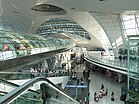
Back Incheon ACE Incheon Afrikaans إنتشون Arabic Incheon AST İnçxon Azerbaijani Incheon BAN Інчхон Byelorussian Инчон Bulgarian Incheon Bislama ইন্ছন Bengali/Bangla
This article has multiple issues. Please help improve it or discuss these issues on the talk page. (Learn how and when to remove these template messages)
|
Incheon
인천시 仁川市 | |
|---|---|
| Incheon Metropolitan City 인천광역시 仁川廣域市 | |
| Korean name transcription(s) | |
| • Hangul | 인천광역시 |
| • Hanja | 仁川廣域市 |
| • Revised Romanization | Incheon Gwang-yeoksi |
| • McCune-Reischauer | Inch'ŏn Kwang'yŏkshi |
|
Clockwise from top: Songdo International Business District, Michuhol District, Incheon Football Stadium, Incheon Bridge, Incheon Port, Incheon International Airport | |
| Anthem: Song of Incheon | |
 | |
| Coordinates: 37°29′N 126°38′E / 37.483°N 126.633°E | |
| Country | South Korea |
| Region | Seoul Capital |
| Subdivisions | List
|
| Government | |
| • Type | Mayor-Council |
| • Mayor | Yoo Jeong-bok (People Power) |
| • Body | Incheon Metropolitan Council |
| Area | |
| • Total | 1,062.63 km2 (410.28 sq mi) |
| Population (October, 2022)[1] | |
| • Total | 2,962,388 |
| • Density | 2,800/km2 (7,200/sq mi) |
| GDP | |
| • Total | KR₩ 104 trillion US$ 83 billion (2022) |
| Time zone | UTC+9 (Korea Standard Time) |
| Area code | +82-31 |
| Dialect | Gyeonggi |
| Flower | Rose |
| Tree | Tulip tree |
| Bird | Crane |
| Website | Official website (English) |
Incheon (Korean: 인천; Hanja: 仁川; Korean pronunciation: [intɕʰʌ̹n]; or Inch'ŏn; literally "kind river"), formerly Jemulpo or Chemulp'o (제물포) until the period after 1910, officially the Incheon Metropolitan City (인천광역시, 仁川廣域市), is a city located in northwestern South Korea, bordering Seoul and Gyeonggi to the east. Inhabited since the Neolithic, Incheon was home to just 4,700 people when it became an international port in 1883. Today, about 3 million people live in the city, making it South Korea's third-most-populous city after Seoul and Busan.[3]
The city's growth has been assured in modern times with the development of its port due to its natural advantages as a coastal city and its proximity to the South Korean capital. It is part of the Seoul Capital Area, along with Seoul itself and Gyeonggi Province, forming the world's fourth-largest metropolitan area by population.
Incheon has since led the economic development of South Korea by opening its port to the outside world, ushering in the modernization of South Korea as a center of industrialization. In 2003, the city was designated as South Korea's first free economic zone.[4][5] Since then, large local companies and global enterprises have increasingly invested in the Incheon Free Economic Zone, including Samsung which chose Songdo International City as its new investment destination for its bio industry.[citation needed]
As an international city, Incheon has held numerous large-scale international conferences, such as the Incheon Global Fair & Festival in 2009. The 17th Asian Games Incheon 2014 was also held in Incheon on 19 September 2014. Incheon has established itself[clarification needed] as a major transportation hub in northeast Asia with the Incheon International Airport and Incheon Port.[citation needed] The large volume of port traffic makes Incheon a Large-Port Metropolis using the Southampton System of Port-City classification.[6]
- ^ 연령별 인구현황 [Population by Age]. Ministry of the Interior and Safety. Archived from the original on 20 April 2018. Retrieved 20 October 2018.
- ^ "2022년 지역소득(잠정)". www.kostat.go.kr.
- ^ "Population, Households and Housing Units". Statistics Korea. 28 July 2022. Retrieved 25 January 2023.
- ^ Bost, F. "World Free Zones Organization; Index cards by country; SOUTH KOREA" (PDF). World Free Zones Organization. Retrieved 15 April 2024.
- ^ Lee, Changwon (1 December 2005). "Development of Free Economic Zones and Labor Standards: A Case Study of Free Economic Zones in Korea". DigitalCollections@ILR. hdl:1813/89761.
- ^ Roberts, Toby; Williams, Ian; Preston, John (2021). "The Southampton system: A new universal standard approach for port-city classification". Maritime Policy & Management. 48 (4): 530–542. doi:10.1080/03088839.2020.1802785. S2CID 225502755.
© MMXXIII Rich X Search. We shall prevail. All rights reserved. Rich X Search









